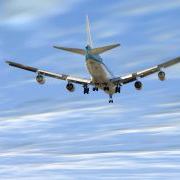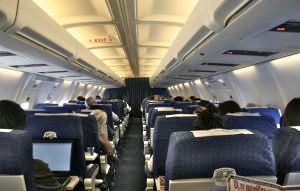 Overseas air travel was previously thought to be somewhat recession-proof, with international routes largely avoiding the cuts and fare hikes that have been common among domestic American routes.
Overseas air travel was previously thought to be somewhat recession-proof, with international routes largely avoiding the cuts and fare hikes that have been common among domestic American routes.
But now that’s all changed.
Over the last year, demand for overseas flights has dropped 5.3 percent and a total of 466,000 seats have been cut from non-stop flights headed from the U.S. to foreign destinations.
According to the International Air Transport Association, the dropoff is directly correlated with a decline in business travel. As Wall Street stumbles and businesses reel from massive layoffs, business executives are simply not traveling at the same rate they used to.
First and business-class passenger traffic over the Atlantic declined 9 percent in November, and Asia routes were hit even harder, suffering a 17 percent decline. New York to London and U.S. to Beijing routes are among the worst-hit.
British Airways is among the worst affected airlines, seeing a 13.7 percent drop in premium traffic last month both domestic and worldwide. This has forced the company to park two of its 747s for the time being. And Northwest Airlines plans to reduce its capacity to Japan, one of its overseas hubs, as its merger with Delta and the shrinking Asian economy has reduced business travel to that region by 30 percent.
 The strength of the business travel market propped up the fortunes of the airline industry during the early months of the recession, at a time when discretionary leisure travel was dropping off at double-digit rates. But now business travelers seem to be watching their pennies like the rest of us, and moving from premium seats to economy class, if they are traveling at all.
The strength of the business travel market propped up the fortunes of the airline industry during the early months of the recession, at a time when discretionary leisure travel was dropping off at double-digit rates. But now business travelers seem to be watching their pennies like the rest of us, and moving from premium seats to economy class, if they are traveling at all.
Hard-won bilateral agreements between countries mean that cutting a route results in losing it entirely, which makes it unlikely that unprofitable international routes will be completely scrapped. To compensate for the decline, air carriers are instead cutting the frequency of flights and switching to smaller planes. United is taking an additional step and reducing the number seats in premium class by 20 percent. And six of the biggest U.S. air carriers have plans to postpone the launch of new international routes.
Despite the gloom and doom, some airlines are swimming against the tide and actually adding international capacity. U.S. Airways, for example, is adding 14.8 percent more seats on non-China international routes, and Delta is adding routes to places such as Haiti, Bermuda and Liberia.
By Karen Elowitt for PeterGreenberg.com.
Related links: USA Today, Portfolio, Atlanta Biz Journal, Seattle Times
Get more air travel news in our Airlines & Airports section.
Check out these related articles on PeterGreenberg.com:












